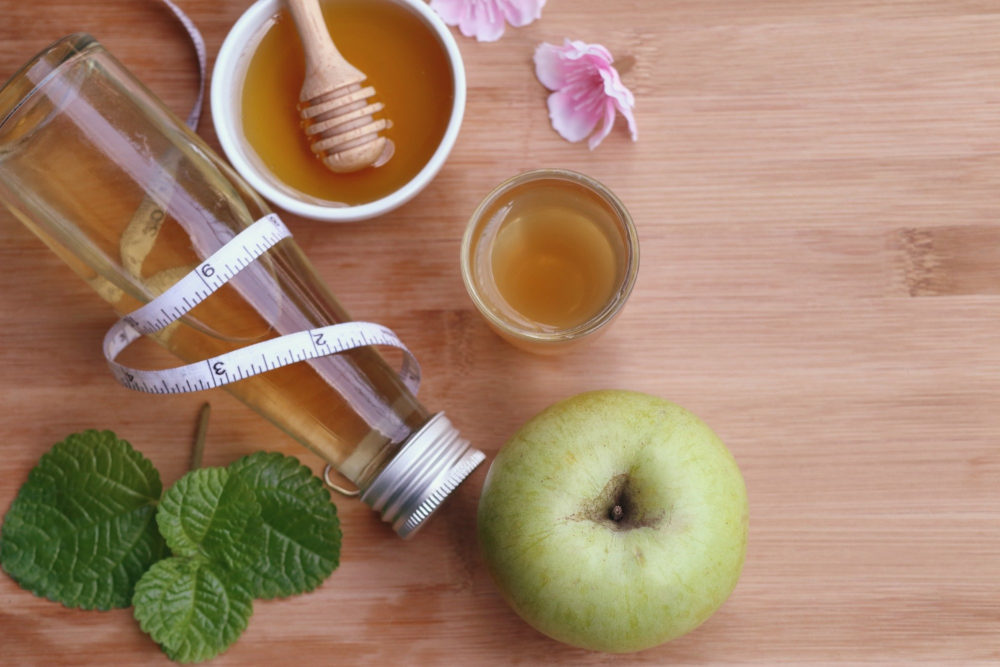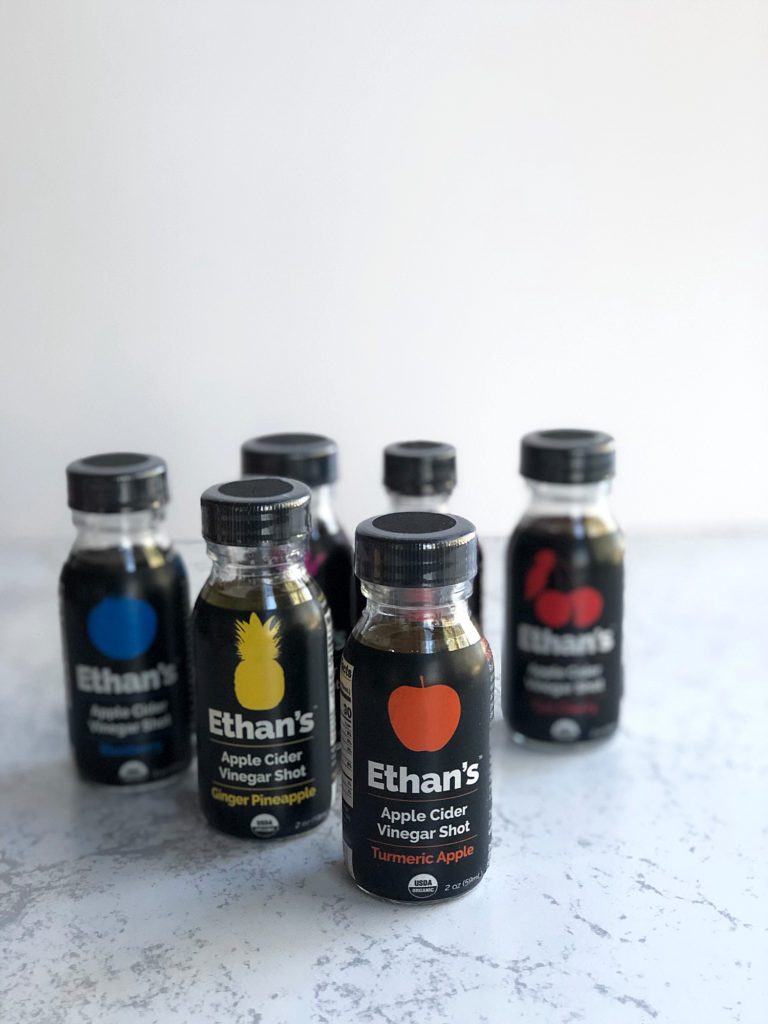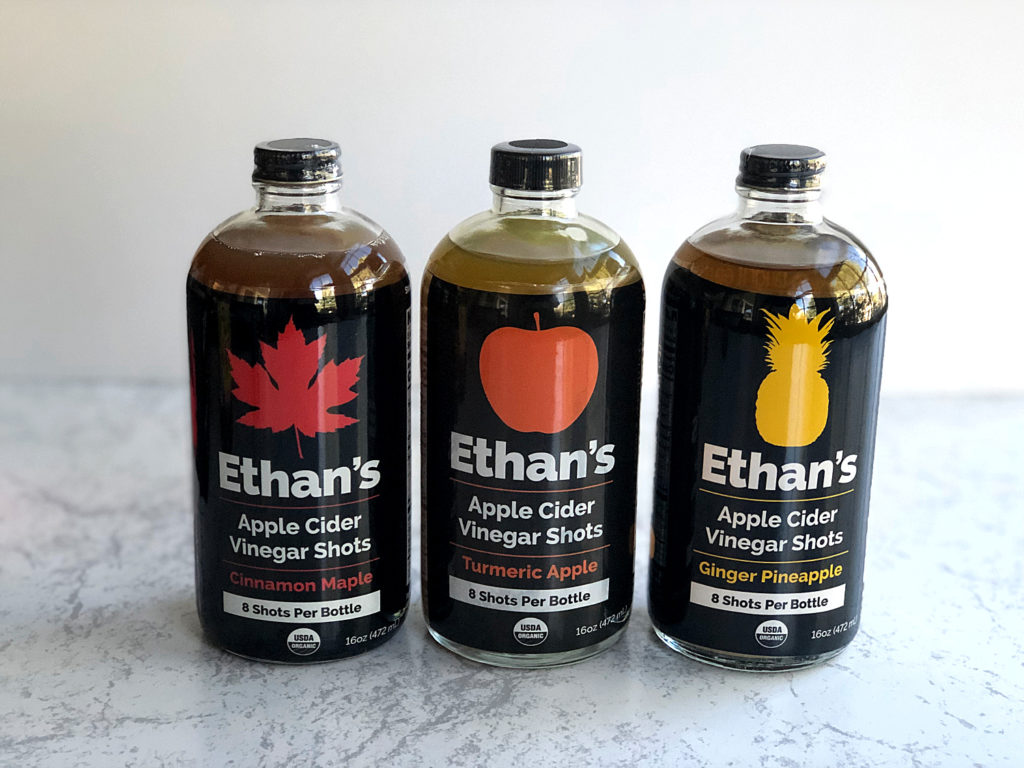
Have you ever wondered if Apple Cider Vinegar was really this magical elixir it’s made out to be? In this post, I’ll sort fact from fiction to help you decode eight facts about apple cider vinegar. This post was originally sponsored by Ethan’s. All opinions are my own. This article is not meant to be used as a substitute for medical advice. Please view my disclosures and disclaimers.
As we head into cold and flu season, I’m reminded of the importance of building my immune system. As someone with an autoimmune disease (celiac disease), and one whose disease initiated in the gut, I’m always looking for natural ways to build my health and immune defenses.
I believe building your immune system is a year-round job – not something you do only during cold or flu season. The goal is to not get sick (or at least lesson the symptoms if you do) as well as to increase your body’s natural ability to fight a virus when it hits.
I’ve heard about the many benefits of apple cider vinegar in promoting good health and have always wondered if I should incorporate it in my daily diet. I usually only sip on apple cider vinegar when I have a cold (diluted in hot water with honey).
But what about drinking it year-round? Could an apple cider vinegar shot a day keep the doctor away?
As luck would have it, a few months ago I learned about Ethan’s. Ethan’s makes flavored apple cider vinegar shots (2 ounces), making it easier than ever to get your daily dose of apple cider vinegar.

There is a lot said and written about apple cider vinegar, including a lot of false health claims. It researching this article, you’d think apple cider vinegar was a magical cure for everything, but alas, it is not. That said, there are some substantiated therapeutic benefits that deserve a closer look.
Because apple cider vinegar has been used a natural healing tonic for centuries, it is surprising to see very few studies related to the health benefits of apple cider vinegar. Perhaps research isn’t there yet, or because there’s little money in selling apple cider vinegar (vs. big money in selling prescription pills), few are willing to tackle such research.
Whatever the case, centuries of naturopathic healers have touted the benefits of apple cider vinegar as a natural, health-promoting elixir.
If apple cider vinegar makes you feel better (as it does for me), I say go ahead and drink it. Just make sure your expectations are aligned with reality as apple cider vinegar is no magical cure-all or substitute for healthy habits. It has some health benefits, yes, but not enough research is available, to date, to prove all the magical health claims made on the Internet.
Bottom line: You are your best scientist. Explore the benefits of a daily dose of apple cider vinegar in your life and see how you feel.
Related Reading: How I Put My Celiac Disease Into Remission
What is Apple Cider Vinegar?
Before we discuss the benefits and debunk myths related to apple cider vinegar, let’s better understand what it is.
Apple cider vinegar is a fermented product made by combining crushed apples with yeast. This process converts the sugar from the apples into alcohol, and then bacteria is added to the mixture to ferment it and turn the sugars into acetic acid. The fermentation process takes about one month to complete.
Apple cider vinegar has a sour taste and pungent odor. The word vinegar is actually a French phrase, vin aigre, which means “sour wine.” The sour taste comes from its key component, acetic acid.
Decoding ACV Health Claims
As mentioned, there are a lot of health claims made about apple cider vinegar, some true, partially true, unsubstantiated or completely false. In this article, I’ll help you decode fact from fiction.
Claim #1: ACV Offers Digestive Support
As someone with a compromised digestive system, I have heard many people claim that apple cider vinegar can quel digestive distress. Is it true? Does apple cider vinegar offer digestive support?
The reasons a lot of people make this claim is because apple cider vinegar contains a live, raw bacteria if it hasn’t been pasteurized and still contains the “mother.” There are numerous, documented benefits of probiotics in supporting gut health, however, none that I could find that specifically support apple cider vinegar’s contribution to gut health. (Note: Ethan’s is pasteurized and does not contain a probiotic benefit.)
Furthermore, a lot of holistic practitioners claim that apple cider vinegar can help ease gas and bloating, however no research has been done to confirm or debunk this claim.
What this means for you: There hasn’t been any scientific studies that corroborate that apple cider vinegar offers digestive support, only antidotal information. It doesn’t mean the claim isn’t true, it just means the research isn’t there to support such claims. Also, most people only drink a couple of tablespoons of apple cider vinegar daily, not enough to get major probiotic benefits anyway. If digestive support is what you’re looking for, consider trying apple cider vinegar (perhaps with a little ginger or lemon juice) and see how you feel. You should also research adding a probiotic to your daily supplement routine.
Claim #2: Apple Cider Vinegar Can Help Detox Your Body
Detox is an ambiguous health claim. The dictionary’s definition of “detox” is to “abstain from or rid the body of toxic or unhealthy substances.” So in the direct sense, the claim that apple cider vinegar rids your body of unwanted toxins is not completely accurate. The truth is your liver, kidneys and intestines are responsible for continually detoxing your body. Some experts say they believe apple cider vinegar can help flush out the liver, but again, I could not find research to support these claims.
However, apple cider vinegar helps cleanse your body in other ways.
First, apple cider vinegar has been known to restore the pH balance of the body. Disease thrives when the body’s pH level is too acidic, and apple cider vinegar is known for its slight alkalinizing effects, similar to lemon juice.
Furthermore, apple cider vinegar contains a polyphenol called quercetin, which is an antibacterial agent known to help treat infections. The drink has also been known to help cure vaginal yeast infections, as anecdotally discuss in a paper published in Alternative Therapies in Health and Medicine.
Also, we know that apple cider vinegar is rich in natural minerals and vitamins, so adding it to your diet can help support good health.
However, I’ve seen claims that apple cider vinegar can help to stimulate circulation and aid detoxification in the liver, but I cannot find formal research to back it up. However, in ancient cultures, it was (and still is) used to purify the blood. This natural detoxification method has been passed down from generation to generation, so it’s surprising that more research hasn’t been done given how long apple cider vinegar has been used in this way!
Apple cider vinegar is also known for breaking up mucus in the body, which may allow for better lymph circulation. Again, I could not find research to back this claim, only anecdotal evidence.
What this means for you: Drinking apple cider vinegar can help kickstart a more healthy lifestyle and it promotes actions that contribute to the detoxification of the body. Is itself a detoxifying agent? More research is needed to know for sure, but due to its ancient roots as a whole body detoxifier, it definitely couldn’t hurt to use it for detoxification purposes.
Claim #3: Apple Cider Vinegar Promotes Weight Loss
A study published in Bioscience, Biotechnology and Biochemistry found that acetic acid, a key component of apple cider vinegar, suppresses body fat accumulation in animal studies. The study concluded that a “daily intake of vinegar might be useful in the prevention of metabolic syndrome by reducing obesity.”
Additionally, in animal studies, the acetic acid found in apple cider vinegar has been known to have beneficial effects on metabolism and in suppressing the accumulation of body fat in lab rats.
Other researchers investigated the effects of vinegar intake on the body mass of obese Japanese. In this double-blind, 12-week human study, subjects were randomly assigned to three groups. One group ingested 500 ml daily of a beverage which either contained 15 ml of vinegar, 30 ml of vinegar, or no vinegar (placebo).
Researchers found that the body weight, BMI, visceral fat area, waist circumference, and serum triglyceride levels were “significantly lower in both vinegar intake groups than in the placebo group.”
Based on these studies, 1-2 tablespoons of apple cider vinegar each day may aid in helping you lose weight, reducing your body fat and decreasing your blood triglycerides (high levels of triglycerides is known to raise the risk of coronary artery disease).
What this means for you: Yes, apple cider vinegar has been scientifically linked to weight loss and reduced body fat. That said, the loss is modest, so I don’t recommend giving up your gym membership in lieu of an apple cider vinegar shot.
Claim #4: ACV Aids in Controlling Blood Sugar
Acetic acid (found in apple cider vinegar) has been shown to block the production of enzymes that digest starch. A study published by Diabetes Research and Clinical Practice found that vinegar consumption can reduce the glucose response in humans after a meal, and will result in a lower blood sugar response after eating a starchy meal.
Another study found that consuming vinegar during a high-glycemic meal “significantly reduced” the blood sugar response post-meal, and the American Diabetes Association found that administering vinegar to diabetes patients post-meal resulted in a significant lowering of a patients’ post-meal blood glucose levels.
What this means for you: While apple cider vinegar won’t cure diabetes, it has been shown to aid in moderately lowering blood glucose levels. People with diabetes should speak with the doctor before adding apple cider vinegar to their diets as it has been known to interact with some medications. Furthermore, it has been proven that acetic acid creates a lower blood sugar response after meals (no more blood sugar highs and lows). This might help you feel fuller longer as your body will more slowly digest food and your blood sugar won’t crash as quickly after a meal.
Claim #5: ACV Reduces Cholesterol
The Bioscience, Biotechnology and Biochemistry also studied the impact of apple cider vinegar on cholesterol and triglyceride levels. Triglycerides is a type of fat (lipid) found in your blood and can be indicative of one’s risk of stroke. During the study, researchers found that animals taking apple cider vinegar had reduced triglyceride levels.
In human studies, researchers reviewed the influence of apple cider vinegar consumption on reducing blood lipid levels. The researchers studied 19 individuals with hyperlipidemia (high levels of fat particles in the blood) and found that “consumption of apple cider vinegar over an eight week period had a beneficial effect in significant reductions in harmful blood lipids.” Researchers added that apple cider vinegar is therefore “recommended as a simple and cost-effective treatment for hyperlipidemia.” (Life Science Journal, 2012)
What this means for you: While only a few studies exist, early research indicates that apple cider vinegar can serve as a natural and inexpensive treatment option for people with high cholesterol.
Claim #6: ACV Helps Relieve Common Cold Symptoms
The use of vinegar to fight infections and other acute conditions dates back to Hippocrates (460-377 BC; the father of modern medicine). Hippocrates had been known to prescribe oxymel, a popular ancient medicine composed of honey and vinegar, to treat persistent coughs.
While little scientific evidence exists that a honey-vinegar elixir can help the common cold, people have been using this natural remedy, and doing it quite successfully, for centuries.
As mentioned, apple cider vinegar contains acetic acids, which are known for their antimicrobial effects. This means they are known to aid in killing pathogens that may lead to infections, such as the common cold or cough. Many people will combine apple cider vinegar with honey, which also is known for its antimicrobial properties. (A study by the Mayo Clinic suggests that honey is a more powerful cough suppressant than OTC cough medication.)
Also, apple cider vinegar can help create a slightly more alkaline environment in your body (bacteria and viruses live in an acidic environment), which may help boost your body’s natural defenses. Apple cider vinegar also contains Vitamin C, which provides all-around immune system support.
What this means for you: While evidence is slim, people have been using apple cider vinegar (usually combined with honey) to help suppress cold symptoms, such as cough, naturally.
Claim #7: ACV Gives You an Energy Boost
Most people reach for a sugary drink or caffeine when they need a jolt of energy, but some experts say you should add one tablespoon of apple cider vinegar to water for a quick, low-calorie energy boost instead.
The more energy your body uses (i.e. physical activity or stress), the more sodium and potassium you need. One tablespoon of apple cider vinegar contains 11 grams of potassium. Athletes often add one tablespoon of apple cider vinegar to their post-workout beverage to help them replenish nutrients in their body.
What this means for you: Yes, apple cider vinegar contains nutrients, such as potassium, that can help replenish nutrients and potentially lead to a natural energy boost.
Claim #8: Apple Cider Vinegar Deters Oxidative Stress
Oxidative stress is the aging inside your body. When you cut an apple, it starts to brown when exposed to air, right? This same kind of “browning” happens inside our bodies and is known as oxidative stress.
Foods high in antioxidants, like apples, blueberries, kale and other fruits and vegetables, combat oxidative stress. Apples used to make apple cider vinegar, for example, contain many polyphenolic compounds and vitamins known to combat oxidative stress. Polyphenols are compounds synthesized by plants that defend against oxidative stress.
In fact, the polyphenols found inside apples has been proven to offer antioxidant protection and reduce a person’s risk of chronic diseases including cancer and cardiovascular disease.
Research published in the Journal of Medicinal Food found that apple cider vinegar may be “beneficial for the suppression of obesity-induced oxidative stress” in animals, too.
What this means for you: Incorporating more fruits containing antioxidants and polyphenols in your diet, like the apples used to make apple cider vinegar, can help you lesson oxidative stress inside your body.
As you can see, there are many possible benefits to adding apple cider vinegar to your daily healthy living routine. People have been drinking apple cider vinegar for centuries as a natural remedy for treating the common cold and treating infections, and emerging research tells us that apple cider vinegar might be able to help us control our weight and maintain blood sugar levels.
Of course, more research is needed to truly understand the impact of apple cider vinegar on one’s whole body health.
How to Incorporate ACV in Your Life
There are many ways you can add apple cider vinegar to your daily routine. Here are a few ideas to get you started:
- Take a diluted shot of apple cider vinegar each day. Ethan’s, a company based in Denver, Colorado, makes flavored apple cider vinegar shots that I can attest are truly delicious. Each flavor profile comes with its own set of additional health benefits as Ethan’s adds things like beets, tumeric and ginger to its apple cider vinegar shots.*

- Add a splash of apple cider vinegar on top of your salads or mix into your homemade salad dressings
- Add apple cider vinegar to water, coconut water or sports beverage after a workout to quickly replenish nutrients in your body.
- Add a little apple cider vinegar to your marinades or sauces to help tenderize meat before cooking.
How do you incorporate apple cider vinegar in your life? Please leave a comment to share.
*You can get Ethan’s apple cider vinegar shots at Whole Foods and Sprouts Farmers Markets nationwide. Please check the company’s store locator to find a location near you or to shop online.
Related Articles
Daily ACV Shot Challenge: Read what happened when I took the 7-day apple cider vinegar daily challenge. Did I lose weight? Settle my tummy? Feel better? Read this article to get the full download.
What you doctor doesn’t know might hurt you. Read my post, 10 Facts Your Doctor Doesn’t Know about Celiac Disease or Gluten Sensitivity.
What You Need to Know about Digestive Enzymes. Better understand how digestive enzymes works to help you digest better.
Confused about gluten-free labels? Read my post to help you understand gluten-free labeling laws from head to toe.
Leave a Comment